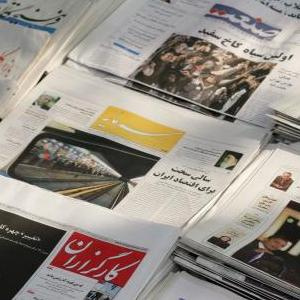Tehran's Daily Newspaper Review

In a follow-up to the Supreme Leader’s speech on Wednesday, Iran interviewed ‘experts’ who asserted that the Nezam’s path has not changed (under Ahmadinejad's presidency, as some of his opponents claim), and called for a stop to controversies. Lotfollah Forouzandeh, a president’s deputy, described the main traits of Ahmadinejad's cabinet as anti-imperialism, austerity, serving the nation and heeding the cause of the Islamic Revolution. Esmail Kowsari, a Principlist MP, also underlined that the Supreme Leader has stifled any likely deviations. Ali-Akbar Javanfekr, Editor-in-Chief of Iran, ran another ethical essay, this time criticizing the greed for worldly possessions.
Jomhouri-ye Eslami’s banner headline was Ali Larijani’s bashing of political struggles and the quest for a share of the elections [cake]. He added that battle between political factions reduces attention to citizens’ real problems. The newspaper also reflected a speech by Ayatollah Mahdavi Kani. The ayatollah stressed that principlism should be the guideline for the right; not group or individual interests. Jomhouri-ye Eslami criticized the cabinet’s decision to add a second day to holidays in celebration of Eid-e Fetr-- the 1st of the Arabic month of Shawwal-- when Muslims celebrate the end of Ramadan, arguing that this and similar decisions such as cutting working hours in Ramadan added to the low efficiency of Iranian public servants, and have created havoc.
“The Old Fox”, Britain’s nickname in the Iranian anti-imperialistic lexicon, is short of breath, Kayhan published in its front page. The headline was boosted by displaying the brutality of the British police in cracking down on protestors, “Oliver Twists” according to Kayhan, who have upset the town five months after the “street comedy” of Prince William [‘s marriage]. Kayhan also quoted Ayatollah Mahdavi Kani who said that the 7+8 committed conservatives assigned with drawing up a united slate for the parliamentary elections is “Principlist, not factionalist.” Kayhan’s editorial called for unity and putting aside petty political differences amid the turbulent situation in Western countries and the Middle East, which have brought the Islamic Republic of Iran an unprecedented opportunity.
Resalat covered former Majles’ Speaker Gholam-Ali Haddad Adel’s speech in the iftar ceremony of the conservative Islamic Society Engineers, where he warned not to downplay the threat of the Fetneh and the “Astray Current”. Haddad Adel added that for Principlists there is no way other than unity for the parliamentary elections later this year. In his editorial, Resalat’s Editor-in-Chief Mohammad-Kazem Anbarlouyi stated that British politicians have “for the moment cast away their humane mask, willing instead to hunt people like wolves, and like foxes [symbol of deception in Persian] lie to their people that the rioters are felons and the protesters are affiliated with drug cartels.”
Shargh focused on the tension between Tehran and London following Iran's strong criticism of the British government’s handling of the unrest. The protest and strike by Tehran Bazaar’s fabric traders on the sales tax (VAT) and the special operation by Iranian police to dismantle satellite dishes from across Tehran were Shargh’s other front page headlines. The newspaper’s op-ed by Hossein Salimi made a socio-historical analysis of the restive days in Britain.
Tehran-e Emrooz focused on the catastrophic performance of the most popular soccer team in Asia, Perspolis FC of Tehran, in the first three weeks of Iran's premier league. It also covered electoral remarks made by key Principlist figures, the demonstrations in Israel and Tehran Municipality’s decision to remove highway U-turns –a famous legacy of Ahmadinejad's two-year mayoralty. Tehran-e Emrooz’ editorial tried to tease out the cause of frequent warnings made by senior Principlist figures about a likely schism in their camp.
“I will bring the Army into the streets,” Vatan-e Emrooz quoted British PM David Cameron. Ayatollah Sedighi’s -occasional Tehran Friday prayer leader- remarks also found a place on the front page, as he asserted that the incidents happening in Britain are the fruit of the country’s crimes across the globe. The famine in Somalia and protests in Saudi Arabia were other headlines appearing on the front page of Vatan-e Emrooz.
* Note: Vatan-e Emrooz does not publish on Thursdays.
Trouble with understanding some terms? Check our Glossary of Iranian Political Terms.
Briefing
Hamshahri (Citizen) is the official daily newspaper of Tehran's Municipality. Its general directions in politics, culture and economy are determined by the mayor of Tehran, currently Mohammad Baqer Qalibaf.
Iran is the official organ of the administration.
Jomhouri-ye Eslami (The Islamic Republic) was known as the official organ of the Party of the Islamic Republic, founded in 1979 and disbanded in 1987. Currently, it is an open critique of Mahmoud Ahmadinejad's policies and is known to be a mouthpiece of Akbar Hashemi Rafsanjani.
Kayhan (Universe) is a hard-line conservative newspaper. Its editor-in-chief –currently Hossein Shari’atmadari- is appointed by Iran's Supreme Leader. Shari’atmadari’s editorials often spark off controversy and debate inside Iranian political circles.
Khabar (News) is a principlist daily newspaper which adopts a critical stance towards Ahmadinejad's policies.
Resalat (Mission) belongs to the moderate wing of the principlist camp. Resalat’s best known analyst is Amir Mohebbian, its political editor.
Shargh (East) is a moderate reformist newspaper. It was the most popular and influential reformist newspaper in its first period of publication which lasted from August 2003 until September 2006.
Tehran-e Emrooz (Tehran Today) is a ‘principlist reformist’ newspaper, connected to Mohammad Baqer Qalibaf.
Vatan-e Emrooz (Motherland Today) -which started its publication in November 2008-, belongs to Mehrdad Bazrpash, the thirty-old pro-Ahmadinejad politician who is also head of Iran's second largest auto manufacturer company, Saipa. Vatan-e Emrooz is a supporter of the president’s policies.

